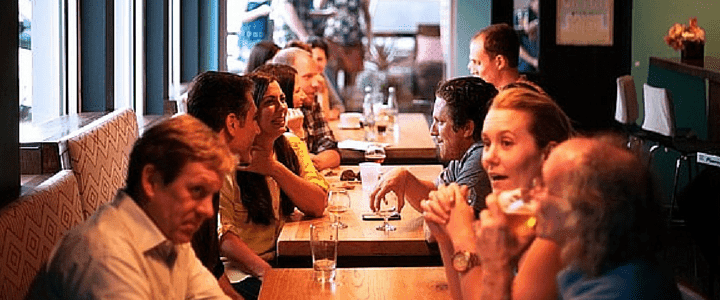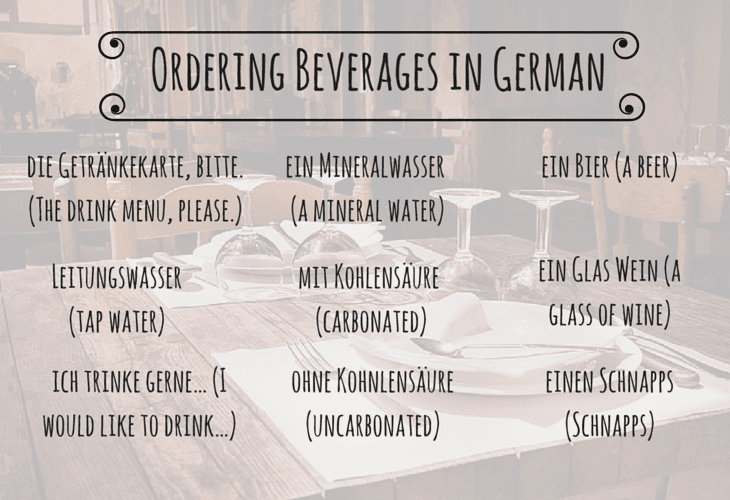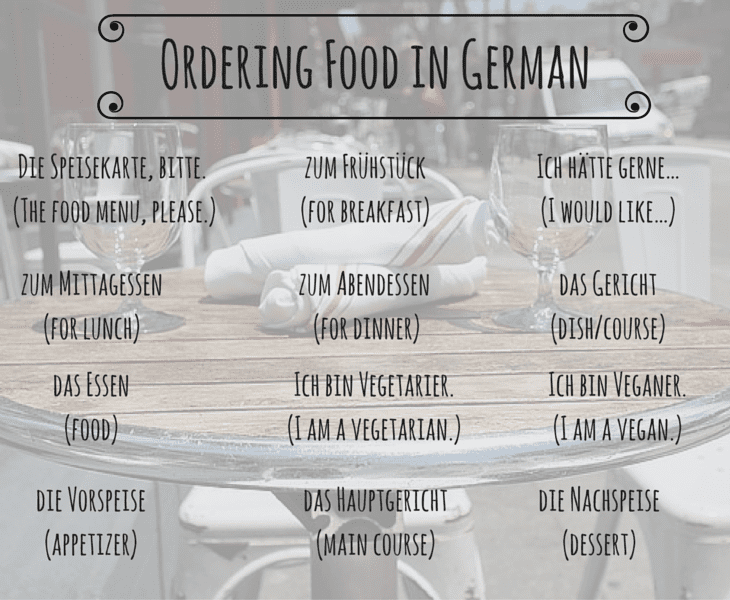Do you want to explore what Germany’s restaurant scene has to offer? Below, German teacher Tyler S. shares some common German phrases and etiquette tips to ensure you have a delicious and enjoyable meal…
Imagine you’re in Germany dining out for the first time. You excitedly enter through the restaurant’s front door, take a quick look around, and wait at what appears to be the host stand.
If you wait to be seated in this manner, you’ll be waiting a long time. In almost every German restaurant, it’s customary that you seat yourself before the wait staff begins serving you.
This is just one example of the cultural differences between American and German restaurants. If you have never dined out in Germany, then you may be surprised by how many other differences there are.
To avoid miscommunication or an unpleasant dining experience, it’s important to learn common German phrases and etiquette tips for dining out.
Below are some quintessential tips you’ll need to know to enjoy your dining experiences in Germany.
Seating
As previously stated, it is customary that you seat yourself in a German restaurant. If you’re unsure if a table is occupied, you can check by using the following common German phrases.
- Entschulding, ist dieser Platz frei? (Excuse me, is this seat unoccupied?)
- Entschulding, ist dieser Tisch frei? (Excuse me, is this table unoccupied?)
Tables are often larger and longer in size, which means you may be joined by others if your table is larger than your dining party.
If you would like to “break the ice” with a group of strangers at your table, it is always nice to ask:
- Entschulding, könnten wir uns hier setzen? (Excuse me, could we sit here?)
Ordering Beverages
Make eye contact with the wait staff to receive service. Avoid excessive waving or yelling as this is considered very rude.
When the server approaches your table, he or she will most likely take your drink orders by asking you one of the following questions:
- Was haben Sie gerne? (What would you like?)
- Was trinken Sie gerne? (What would you like to drink?)
In most American restaurants, it’s common to order tap water. In Germany, however, people only drink mineral water. In fact, if you ask for Leitungswasser (tap water), you’ll be met with strange looks.
Below are various common German phrases and words to help you order a beverage.
Requesting Food
From Schnitzel to Apfelstrudel, there are dozens of delicious German dishes that you’ll want to try. Each region has it’s own specialty dishes, so be adventurous when ordering.
Also, make sure you’re patient with your server, as the German dining experience is much more relaxed and courses are not rushed. Use both your fork and knife to eat almost all foods. Pay attention to how your dining party is eating and copy their mannerisms if possible.
To order something to eat, use the common German phrases and words below.
Paying the Bill
When paying the bill, be sure to tell your server how much you’re paying when you hand them the money.
- Bezahlen, bitte. (The bill, please.)
- Ich zahle… (I’ll pay…)
Traditionally, the one who invites the dining party out is the one who pays. If you’re getting separate checks, make sure your server knows by using the following common German phrases.
- Bitte, alles zusammen. (All together, please.)
- Getrennte Rechnungen, bitte. (Separate checks, please.)
Paying with a credit card can be a risky, as most establishments only take cash. Having some Bargeld (cash) on you is a great way to save yourself trouble. If you’re in doubt, however, you can ask a staff member the following questions:
- Akzeptieren Sie Visa? (Do you take Visa?)
- Akzeptieren Sie Discover? (Do you take Discover?)
- Akzeptieren Sie MasterCard? (Do you take MasterCard)
Tipping is required by law in most cases and included in the bill’s total. This is usually within the range of 10%-15%. In Germany, most people will leave an extra tip on top of the bill’s total if they received satisfactory service. If you don’t need change when tipping, use the common German phrase:
- Es stimmt so. (Keep the change/the rest is yours.)
Another helpful tip, don’t leave your tip on the table in Germany. Make sure your server has it or he or she may not end up receiving it.
By learning German vocabulary and etiquette tips, you’ll have a much more enjoyable time dining out. Here’s to your great dining experiences in Germany!
Zum Wohl! (Cheers!)
 Post Author: Tyler S.
Post Author: Tyler S.Tyler S. teaches in-person German lessons in Minneapolis, MN. He received his Bachelor’s degree in German and linguistics from the University of Minnesota, and has experience working as a teaching assistant and private tutor with TakeLessons since 2008. What’s more? He can speak 7 different languages! Learn more about Tyler here!
Brooke Neuman




